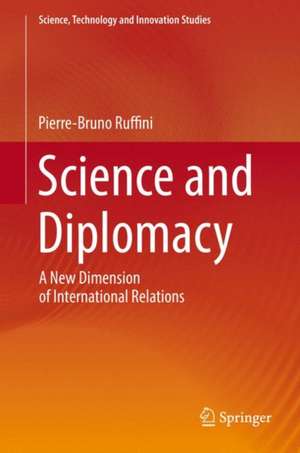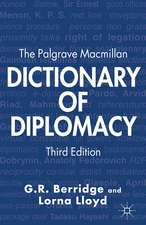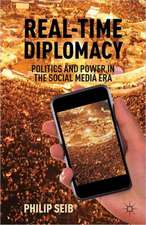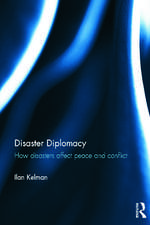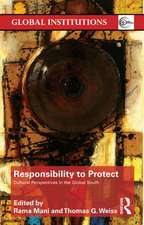Science and Diplomacy: A New Dimension of International Relations: Science, Technology and Innovation Studies
Autor Pierre-Bruno Ruffinien Limba Engleză Hardback – 16 mai 2017
Written by a professor of economics and former Embassy counselor for science and technology, the book sets out to answer the following questions: Can science issues affect diplomatic relations between countries? Is international scientific cooperation a factor for peace? Are researchers good ambassadors for their countries? Is scientific influence a particular form of cultural influence on the world stage? Do diplomats really listen to what experts say when negotiating on the future of the planet? Is the independence of the scientist threatened by science diplomacy? What is a scientific attaché for?
| Toate formatele și edițiile | Preț | Express |
|---|---|---|
| Paperback (1) | 774.04 lei 6-8 săpt. | |
| Springer International Publishing – 28 iul 2018 | 774.04 lei 6-8 săpt. | |
| Hardback (1) | 779.89 lei 6-8 săpt. | |
| Springer International Publishing – 16 mai 2017 | 779.89 lei 6-8 săpt. |
Din seria Science, Technology and Innovation Studies
- 15%
 Preț: 362.76 lei
Preț: 362.76 lei - 15%
 Preț: 650.69 lei
Preț: 650.69 lei - 15%
 Preț: 533.20 lei
Preț: 533.20 lei - 18%
 Preț: 950.96 lei
Preț: 950.96 lei - 18%
 Preț: 774.04 lei
Preț: 774.04 lei - 18%
 Preț: 1115.77 lei
Preț: 1115.77 lei - 18%
 Preț: 898.43 lei
Preț: 898.43 lei -
 Preț: 480.83 lei
Preț: 480.83 lei - 18%
 Preț: 886.43 lei
Preț: 886.43 lei - 18%
 Preț: 891.96 lei
Preț: 891.96 lei - 18%
 Preț: 996.46 lei
Preț: 996.46 lei - 18%
 Preț: 1000.56 lei
Preț: 1000.56 lei -
 Preț: 390.08 lei
Preț: 390.08 lei - 18%
 Preț: 1000.87 lei
Preț: 1000.87 lei - 24%
 Preț: 911.54 lei
Preț: 911.54 lei - 18%
 Preț: 889.12 lei
Preț: 889.12 lei - 18%
 Preț: 1119.56 lei
Preț: 1119.56 lei
Preț: 779.89 lei
Preț vechi: 951.08 lei
-18% Nou
Puncte Express: 1170
Preț estimativ în valută:
149.23€ • 155.81$ • 123.51£
149.23€ • 155.81$ • 123.51£
Carte tipărită la comandă
Livrare economică 04-18 aprilie
Preluare comenzi: 021 569.72.76
Specificații
ISBN-13: 9783319551036
ISBN-10: 3319551035
Pagini: 132
Ilustrații: XI, 132 p. 1 illus.
Dimensiuni: 155 x 235 x 10 mm
Greutate: 0.38 kg
Ediția:1st ed. 2017
Editura: Springer International Publishing
Colecția Springer
Seria Science, Technology and Innovation Studies
Locul publicării:Cham, Switzerland
ISBN-10: 3319551035
Pagini: 132
Ilustrații: XI, 132 p. 1 illus.
Dimensiuni: 155 x 235 x 10 mm
Greutate: 0.38 kg
Ediția:1st ed. 2017
Editura: Springer International Publishing
Colecția Springer
Seria Science, Technology and Innovation Studies
Locul publicării:Cham, Switzerland
Cuprins
1 Introduction.- 2 What Is Science Diplomacy.- 3 Science diplomacy as a National Issue.- 4 Science in Diplomatic Apparatus: The Diversity of National Approaches.- 5 Science in the Vanguard of Diplomacy.- 6 Multilateral Science Diplomacy.- Conclusion.
Recenzii
“A wide range of readers including academics and diplomats, as well as students with science policy, international relations, or diplomatic studies majors as well as anyone else who is not indifferent to modern global challenges that are undoubtedly rooted in science and guided by technological choices, will find this book greatly interesting.” (Olga Krasnyak, The Hague Journal of Diplomacy, Vol. 14, 2019)
Notă biografică
Pierre-Bruno Ruffini is a Professor of Economics at the University of Le Havre (France) 1992; Counselor for Science and Technology - Embassy of France in Russia (2007-2010) and Italy (2010-2013), President of the University of Le Havre 2000-2005.
Textul de pe ultima copertă
This book examines in depth science diplomacy, a particular field of international relations, in which the interests of science and those of foreign policy intersect. Building on a wealth of examples drawn from history and contemporary international relations, it analyzes and discusses the links between the world of scientists and that of diplomats.
Written by a professor of economics and former Embassy counselor for science and technology, the book sets out to answer the following questions: Can science issues affect diplomatic relations between countries? Is international scientific cooperation a factor for peace? Are researchers good ambassadors for their countries? Is scientific influence a particular form of cultural influence on the world stage? Do diplomats really listen to what experts say when negotiating on the future of the planet? Is the independence of the scientist threatened by science diplomacy? What is a scientific attaché for?
Written by a professor of economics and former Embassy counselor for science and technology, the book sets out to answer the following questions: Can science issues affect diplomatic relations between countries? Is international scientific cooperation a factor for peace? Are researchers good ambassadors for their countries? Is scientific influence a particular form of cultural influence on the world stage? Do diplomats really listen to what experts say when negotiating on the future of the planet? Is the independence of the scientist threatened by science diplomacy? What is a scientific attaché for?
Caracteristici
The first book to provide a comprehensive account of the emerging topic of science diplomacy Identifies and explains the links between science policy and diplomacy Presents a wealth of examples from historic and contemporary international relations
